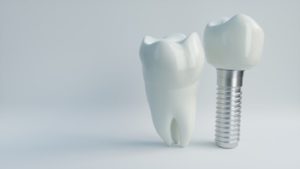
Your smile is one of the first things that people notice about you—so if you have gaps in it due to missing teeth, your self-confidence can take quite a hit! Not to mention, missing teeth often leads to additional teeth falling out. This means that replacing those lost pearly whites is in your best interest, and dental implants are arguably the best way to go about it. That said, you might have a few questions about the cost of such an incredible solution. Here are four factors that contribute to the price tag.
Factor #1: How Many Implants Are Needed
Naturally, the more teeth you need replaced, the more implants you’re going to need! If you only have one or two teeth that you need to replace, your bill usually won’t run too high. But if you have multiple lost teeth or an entire row missing, you’re going to be looking at a higher total cost. In these cases, it’s sometimes worth looking into other tooth replacement options. Although they aren’t quite as advanced and durable as implants, options like bridges or dentures are still effective at replacing multiple lost teeth in a row.
Factor #2: The Location & the Placement Procedure
Believe it or not, front teeth are actually more expensive to replace than back teeth in most instances! This is because your dentist must carefully ensure that the implants are properly matched to the angle of your jawline, and that they don’t alter your bite pattern. Additionally, your dentist might also have to utilize various methods to place your implants, depending on the teeth being replaced and the complexity of the solution. This all boils down to your dentist having to do additional work and take certain things into consideration, which can increase the cost of treatment.
Factor #3: Additional Oral Surgeries
Sometimes a patient needs dental implants, but their mouth isn’t quite ready for them just yet. In some instances, the jawbone doesn’t have sufficient density for fully supporting dental implants—and since implants rely on the fusion between implant and bone, a dental bone graft is sometimes necessary beforehand. Other times, something like a tooth extraction or gum disease therapy might be necessary. In any case, additional oral surgeries, regardless of their nature, will inevitably drive up your final bill.
Factor #4: Patient’s Overall Oral Health
Your dentist cannot clear you for dental implants until your oral health has been deemed satisfactory—so if there’s anything currently threatening your oral health, such as untreated gum disease, it’ll need to be treated before you can move forward with the implant process. Depending on the severity of these issues and any extra precautions that might be necessary, the total cost of treatment can continually climb higher. Simply put, the better your oral health is, the less likely you’ll have to spend extra!
Knowing the factors that determine the cost of dental implants can help you to make an informed decision about how to restore your smile. That said, don’t hesitate to speak with your dentist if you have questions about dental implants or their cost.
About the Practice
The team at Edison Prosthodontics is thrilled to serve the dental needs of the Edison community under the leadership of Dr. Vrajesh Shah. Dr. Shah received his dental doctorate from the New York University College of Dentistry and has over 20 years of experience in several fields. He’s also a member of many notable professional organizations including the American Dental Association and the American Academy of Implant Dentistry. His practice is pleased to offer a wide range of available services including dental implants. To schedule a visit, please reach out online or by phone: (732) 906-0077.
